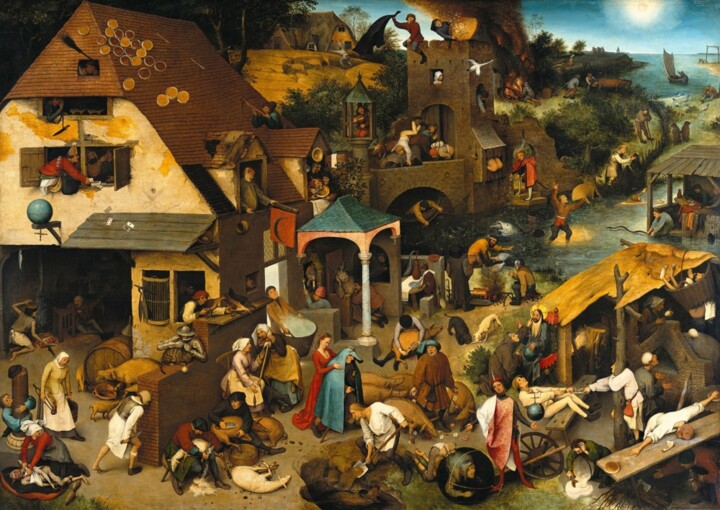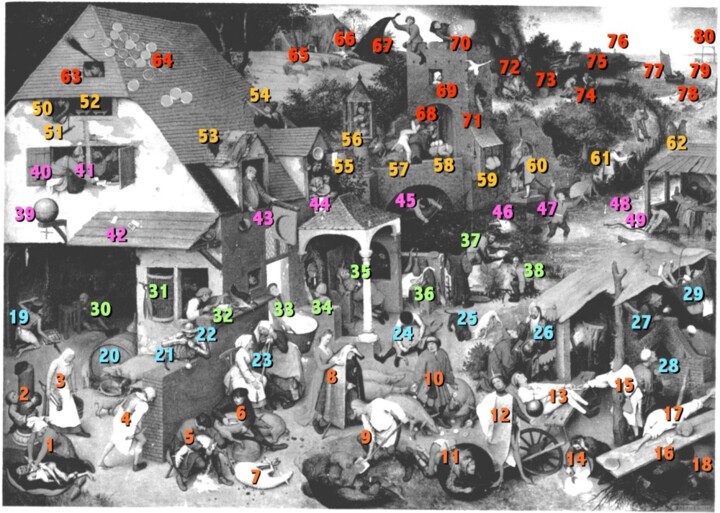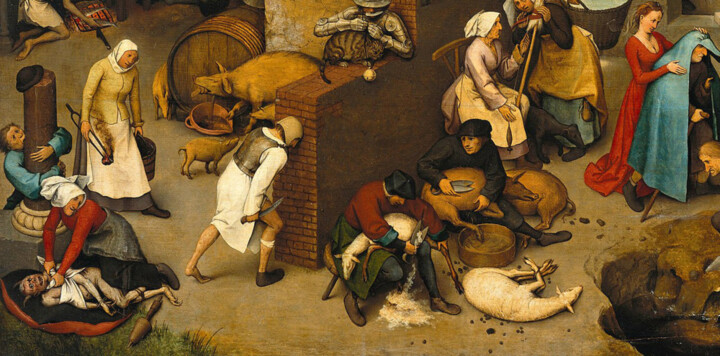 The Flemish Proverbs , Pieter Brueghel the Elder, 1559, Gemäldegalerie Berlin (Germany)
The Flemish Proverbs , Pieter Brueghel the Elder, 1559, Gemäldegalerie Berlin (Germany)
Who was Brueghel?
Pieter Brueghel the Elder was a Northern European Renaissance artist whose paintings celebrate the common mass of humanity. It is thus distinguished from the religious paintings that dominated much of Renaissance art in the previous century. He was born in the 1520s in what is now the Netherlands, to a peasant family. His work focuses on rural working life, religion and superstition, as well as the political and social intrigues of his time. These themes were approached with an inimitable, dry and often grotesque sense of humor, an emphasis on the group rather than the individual, and a healthy skepticism for stories of great facts and men.
Flemish proverbs
This painting is sometimes called " The Reversed World or The Blue Huque ". Today, it is more often called "The Flemish proverbs".
At first glance, this work by Bruegel looks like a village and its inhabitants going about their daily business. Bruegel's works often feature many people, such as at weddings, balls, fairs, and battles. But in this painting, each person or small group has a different function and meaning from the others. This abundance does not detract from the clarity of the composition, which is strong in the foreground and leads to the sea and the sky through an angled opening. There is no single place or time. The earth, the sky, the water, the fire, the fish, the animals, the peasants, the bourgeois, the soldiers, the priest, god and the devil cohabit happily in an invented village with large houses, thatched cottages, medieval towers and steeples.
All the interest of the painting lies in the proverbs. Each person or thing appears in 80 proverbs (one hundred and eighteen according to some authors). Bruegel transforms into images well-known sayings, sayings that warn or give lessons, and sentences that say a lot with few words. He takes a look at the world of men and their mistakes with a composition seen from above. Even if there is humor, the subject remains pessimistic and marked by deception: the blue shell, which represents the husband who has been cheated on, and the upside-down world shown by the blue globe on which a fool succeeds.
Each proverb is a closed world with a fixed idea, character trait or obsession, even if some of them can be extended or have similarities with other proverbs. Brueghel seems to want to tell us that the fixed ideas he has placed on the same board do not speak to each other: each character is a prisoner of his own, and we are all prisoners of ourselves.
Analysis of proverbs
Let us not forget that Bruegel's paintings were intended for wealthy and humanistic amateurs and that only a small number of people with a certain culture could understand his engravings. After 400 years, the references to time are no longer clear to the viewer.
When the moment is right or when it is necessary, the limits of symbolism, allegory, parody, satire or caricature are quickly reached and sometimes crossed. This is what the data in this table shows. The collection of 85 or 118 proverbs on a 117 cm by 163.5 cm panel is more of a tour de force than a masterpiece. It takes virtuosity to avoid the effects of accumulation and disorder while adopting an encyclopedic approach to the subject. Proverbs, on the other hand, needs similar information but has nearly a hundred separate creations, one for each proverb. Brueghel then has to make sure that all the subjects, each with its own meaning, fit together not only clearly but also happily. At first glance, the 1559 work, which is the first large-format painting by "Bruegel" to be signed and dated, might look like an animated landscape. From the start, the crowd of characters stands out. There is movement and rhythm, but there is no relationship between the two. Each character or group, which does not have more than three people, is prisoner of its own world and has a job that has nothing to do with that of the neighbor or neighbors.
He paints a universal picture of madness using proverbs that describe it in people. Bruegel the Elder was so fond of painting pictures of Flemish proverbs because they were so well written that he only had to copy them word for word to obtain the most beautiful effects. All the local sayings that make fun of errors and inconsistencies, tie the bell to the cat, speak with two mouths, one shearing the sheep and the other the pig, wanting to pierce a wall with your head, carrying daylight in a basket, etc. are so many pretexts for sketches. Together, they form an astonishing encyclopedia of stupidity.
Most specialists see it as a simple example of how these popular proverbs condense the wisdom of the people, and they only seek to understand the meaning of each proverb. Does this mean that Breughel's message should not be taken seriously? The main idea of the painting is to show how stupid people are, but the story is made up. This comes less from the artist's collection of proverbs than from sayings or simple phrases that were common in his country and in his time.
Proverbs and their meaning
 Painting with Explanation of Flemish Proverbs , Pieter Brueghel the Elder, 1559, Gemäldegalerie Berlin
Painting with Explanation of Flemish Proverbs , Pieter Brueghel the Elder, 1559, Gemäldegalerie Berlin

1) Bind the devil to the pillow (Women are smarter than the devil)
2) A pillar biter (hypocrite)
3) She carries fire in one hand and water in the other (strong-tongued person).
4) Banging your head against the wall (stubbornly trying the impossible without thinking).
5) Sheep must be sheared according to the wool they have (do not seek your advantage at all costs)
6) One shears the sheep, the other the sow (one lives in abundance, the other in misery)
7) Patient like a lamb (Be very docile)
8) Put a blue coat on the man (trick him)
 9) He fills the well after the drowning of the calf (nothing is done until it is too late).
9) He fills the well after the drowning of the calf (nothing is done until it is too late).
10) Throwing roses (pearls) to swine (wasting money on something useless).
11) He who wants to cross the world must bend down (he who wants to become someone must adapt).
12) He holds the world to his thumb (he makes everything dance his way)
13) Shoot for the biggest piece (Always want the biggest piece)
14) The person who spilled his porridge cannot recover everything (the damage is irreparable).
15) Cling to the side of the purse (love hangs from the side of the purse)
16) A rake without a handle (something useless)
17) He goes from one loaf to another (he can't get away with his money).
18) He is looking for the ax (looking for a pretext); he can shine his light (he can show what he can do)
 19) He fried the herring because of the rye (sacrificing a small thing for a big benefit).
19) He fried the herring because of the rye (sacrificing a small thing for a big benefit).
20) Here the sow removes the cone (negligence takes revenge)
21) He puts the cat in the collar (shouting a company from the rooftops and thus compromising it)
22) Be armed to the teeth (Be heavily armed)
23) One wraps on the distaff what the other spun (Gossip)
 24) The pig is bitten through the belly (something is irrevocably decided)
24) The pig is bitten through the belly (something is irrevocably decided)
25) Two dogs on one leg (bone) rarely agree (arguing bitterly over one thing)
26) He attaches to God a beard in the form of a leaf (deception under the mask of hypocrisy)
27) She grabs the chicken egg and drops the goose egg (making a bad choice without thinking).
28) He tries to open his mouth wider than an oven hatch (he overestimates his abilities).
29) He falls through the basket (receiving a basket/rebuff); he is suspended between heaven and earth (he is in a bad situation).
 30) He's sitting between two chairs (he can't make a decision/he's not on either side)
30) He's sitting between two chairs (he can't make a decision/he's not on either side)
31) There are scissors sticking out (He must not be trusted)
32) Take care of the unlaid eggs (Someone who cares about the uncounted eggs)
33) He carries the light in the basket to the day (wasting his time unnecessarily)
34) Light candles for the devil (make friends with everyone)
35) Go to confession to the devil (entrust secrets to your enemies)
 36) What good is a nice plate if there is nothing on it?
36) What good is a nice plate if there is nothing on it?
37) He catches the fish with his hands (he catches the fish in the net that the others set / he is clever).
38) Sit on Hot Coals
 39) The world upside down 40) He shits on the world (he despises the world)
39) The world upside down 40) He shits on the world (he despises the world)
41) Biggest fools get the best cards
42) How the cards fall (how lucky we are)
43) He pisses against the moon (he strives to achieve the impossible)
44) Throw someone over the spoon (make fun of someone)
 45) Fishing behind the net (missing the opportunity) 46) The big fish eats the small.
45) Fishing behind the net (missing the opportunity) 46) The big fish eats the small.
47) The well-being of the neighbor pains me, offends me, that the sun laughs in the water (resentment)
48) Swim against the tide (Be against the majority opinion)
49) Catch the eel by the tail (undertake a difficult thing)
 50) He looks through the fingers (when you have an advantage, you don't look too much if things are done correctly)
50) He looks through the fingers (when you have an advantage, you don't look too much if things are done correctly)
51) There's a knife hanging down (someone is challenged)
52) There are clogs (we wait in vain)
53) Have a hole in the roof
54) Send one arrow after another (false perseverance); to have shot his arrows (to have nothing left in reserve)
55) It grows out the window (we can't keep it a secret)
56) He plays the pillory (in injustice, do not draw attention to himself yet)
 57) Falling from ox to donkey (doing bad business) 58) He rubs his ass against the door (to make fun of something), to carry his package (to carry his misfortune).
57) Falling from ox to donkey (doing bad business) 58) He rubs his ass against the door (to make fun of something), to carry his package (to carry his misfortune).
59) They shit through the same hole (inseparable buddies); it hangs like a crapper above the ditch (unequivocal affair).
60) Throwing money out the window (throwing away; wasting money unnecessarily)
61) Hanging your cast-off over the fence (starting something new without knowing what to expect).
62) He sees the bears dancing (he sees, because of hunger, something that is not there)
 63) Married under the broom (living together without the blessing of the church); the broom comes out of there (the master is not at home).64) There, the roof is covered with cakes (there is plenty)
63) Married under the broom (living together without the blessing of the church); the broom comes out of there (the master is not at home).64) There, the roof is covered with cakes (there is plenty)
65) If the gate is open, the pigs rush into the grain (unattended, everything goes haywire).
66) Whoever eats fire shits sparks (he who undertakes something dangerous should not be surprised at the consequences).
 67) Hanging his coat in the wind (opportunism) 68) He kisses the ring (exaggerated respect)
67) Hanging his coat in the wind (opportunism) 68) He kisses the ring (exaggerated respect)
69) She looks at the stork (wasting her time)
70) Feathers tossed in the wind (working without a plan and without success)
71) Kill two birds with one stone (excessive ambition)
72) It doesn't matter to him who owns the house that is burning, as long as he can warm himself in the fire (take advantage of every opportunity to take advantage of it).
73) He drags the millstone behind him (to persist for a lost/useless cause).
74) Candy apples are not figs (don't be fooled).
75) If a blind man guides another, they both fall into the ditch (if an ignorant man guides another, there will be misfortune).
76) The journey is not yet complete if one still recognizes the church and the tower (the goal of an undertaking is achieved only when the success is completed).
77) Sail ahead of the wind (under favorable circumstances, easily achieve success)
78) I am not called to herd geese, so I let geese be geese.
79) He cheats with the gallows (he fears no punishment)
80) Where there is carrion, crows fly


 Selena Mattei
Selena Mattei





